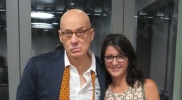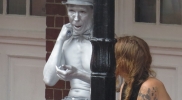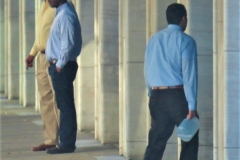|
|
Best Trivia - Philosophy
|
Favorite Trivia – PHILOSOPHY
|
| “Be yourself. Everybody else is taken.”
Oscar Wilde
|
| “Existence: Draining one’s own self dry without the sense of thirst.”
Sartre – Age of Reason
|
| “Happiness is the meaning and the purpose of life, the whole aim and end of human existence.”
Aristotle
|
| “And remember: no matter where you go, there you are.”
Confucius
|
|
“The true medicine of the mind is philosophy.” [Philippicae., III, 3.]
Cicero
|
|
“Teach me to live that I may dread
The grave as little as my bed.”
Bishop Ken – Evening Hymn
|
| “A cure for all diseases of the soul may be found in the charms and spells of philosophy, if the patient will but submit to treatment.” [Epistles, I. I.]
Horace: Satires, Epistles and Ars Poetica, trans. by H. Ruston Fairclough
|
| “They must often change, who would be constant in happiness or wisdom.”
Confucius
|
|
“If, as Socrates said, All men in the world should come and bring their grievances together, of body, mind, fortune, sores, ulcers, madness, epilepsies, agues, and all those common calamities of beggar, want, servitude, imprisonment, and lay them on a heap to be equally divided, wouldst thou share alike and take thy portion or be as thou art? Without question thou wouldst be as thou art.”
Burton, The Anatomy of Melancholy (Christopher Morley’s Book of Days for 1931 [May 27])
|
| “The necessity of dying, was what the Philosophers owed their Constancy of Mind to; they thought when there was no Remedy, but a Man must go, it was best to go with a good Grace. And, since there was no Possibility of making their Lives Eternal, they would stick at nothing to make their Names so, and secure all that from the Wreck, which was capable of being secured. Let us put the best Face upon the Matter we can, satisfie our selves with not speaking all we think; and hope more from a happy Constitution, than all the feeble Reasonings, that gull us with a Fancy of our being able to meet Death unconcerned. The Honour of dying gallantly; the Hope of being lamented when we are gone; the Desire of leaving a good Name behind us; the Certainly of a Deliverance from the Miseries of the present life, and of depending no longer upon a fickle and humoursome Fortune, are Remedies that we shall do well to make our best of.” [CCCCXII]
The Moral Maxims And Reflections of the Duke De La Rochefoucauld
|
| “The World is so fond of every thing, that is fresh and uncommon, that Men take secret Pleasure, and find Entertainment, even in the Sight of the dismalest and most tragical Accidents; and that, partly because they are new, and partly from a Principle of ill Nature that is in us.” [DLXXXIII]
The Moral Maxims And Reflections of the Duke De La Rochefoucauld
|
| “Doctor, how do I know I exist?” “Who’s asking?”
Saul Bellow
|
| “Speak, that I may see you.”
Socrates says to a visitor
|
| “It is delightful when in smooth water to recall the stormy times that are past.” [Ad Familiares., IV, 8.]
Cicero
|
| appeaser: One who feeds a crocodile, hoping it will eat him last. – Winston Churchill [Republicans with Trump – me]
Webster’s Unafraid Dictionary: Defiant Definitive Put-Downs – Leonard Louis Levinson
|
| Latin: “Certe ignoratio futurorum malorum utilior est quam scientia’ English: “Certainly our ignorance of impending evils is better than our knowledge of them.”
W. Francis H. King – Cicero Div. 2, 9, 23, A Dictionary of Classical and Foreign Quotations
|
| “Enjoy what you can, endure what you must.”
Goethe
|
| Stoicism: Happiness is dependent on our perspective of things. “Seek not that the things which happen should happen as you wish; but wish the things which happen to be as they are, and you will have a tranquil flow of life.” – Epictetus
“Things are as they are meant to be.” – Patty Martino Alspaugh
“Keep things in perspective” – Tony Martino (a.k.a., my Dad, who lucky for me preached this unmercifully) |
“You get so full, you have to give some, or
you’ll burst. That’s what life is: you either
give or you take. I hope I don’t take too
much from life. I hope I give more.”
Katherine (Sandy) Martino (a.k.a., my Mom) – “Octogenarian Brings God to Inmates” by Kristen Bryd in The Catholic Virginian, October 22, 2018
|
| “There is only one way to avoid criticism: do nothing, say nothing, and be nothing.”
Aristotle
|
| “You can discover more about a person in an hour of play than in a year of conversation.”
Plato
|
| “Life is an unpleasant business; I have resolved to spend it reflecting upon it.”
Arthur Schopenhauer
|
|
“Do not desire to know too much—so only shall you grow to know intuitively; for the knowledge acquired by unnatural striving only leads away from Tao. Strive not to know all there is to know concerning the men and things around you, nor concerning their relations and antagonisms. Above all, seek not happiness too greedily, and be not fearful of unhappiness.”
Lao-Tzu, Wu Wei (Christopher Morley’s Book of Days for 1931 [March 1])
|
| “He that complies against his will is of his own opinion still.”
Samuel Butler
|
|
“If I am in error in believing that the soul of man is immortal, I err willingly; not have I any desire, while life lasts, to eradicate the error in which I take delight. But if, after death (as some small philosophers think), I shall feel nothing, I have no fear that those departed philosophers will ridicule my error.” [De Senectute., I, 23.]
Cicero
|
| “To have been always what I am—and so changed from what I was.” – Winnie
Samuel Beckett – Happy Days
|
| “Just as medicine confers no benefit if it does not drive away bodily disease, so is philosophy useless if it does not drive away the suffering of the mind.”
Epicurus
|
| “Aristippus founded the Cyrenaic school, which taught that man should control circumstances, not be controlled by them.” [Epistles, I.I. Notes]
Horace: Satires, Epistles and Ars Poetica, trans. by H. Ruston Fairclough
|
| “Minds are like parachutes, if they are closed they won’t hold you up.”
David Baird – A Thousand Paths to Enlightenment
|
| “Human beings are privileged in not knowing the future. That is one of the diamonds in our diadem of free will. If we were to lose it, we would become automations in a world of machines.” [August 9, 1942]
A German Officer In Occupied Paris: The War Journals, 1941-1945 – Ernst Jünger (trans. by Thomas S. Hansen and Abby J. Hansen)
|
| “There is nothing too absurd for a philosopher to utter.”
Cicero
|
| “At first [Man] is nothing. Only afterward will he be something, and he himself will have made what he will be.”
Sartre
|
|
“If you make people think they’re thinking, they’ll love you; but if you really make them think, they’ll hate you.”
(Christopher Morley’s Book of Days for 1931 [June 9])
|
| “Expect everything, I always say, and the unexpected never happens.” (The Whether Man)
Norton Juster – The Annotated Phantom Tollbooth (Illustrated by Jules Feiffer; Annotations by Leonard S. Marcus)
|
| “One thing is fact: if you worry about tomorrow, tomorrow comes. If you don’t worry about tomorrow, tomorrow comes.”
David Baird – A Thousand Paths to Long Life
|
| “Stoicism was founded by Zeno, a Crypriot who came to Athens around 313 B.C.E. . . . For the Stoics, the first law of nature was: Resistance to life’s depredations—illness, aging, poverty, grief, and death—is futile. The smart thing to do, according to Zeno, was not deny these realities but find a way to live with them. So the second law was: Because so much of what happens to you is outside your control, shift the focus to the one thing that is within your power—your attitude. In other words, happiness is a question of mind over matter . . . Unhappiness results from an attitude problem; namely, the refusal to accept the way things work.”
Geary – The World in a Phrase: A Brief History of the Aphorism
|
| “Life is absurd and meaningless and full of nothingness. Possibly this doesn’t strike you as helpful and cheerful, but I think it is—because it’s honest and because it goads you on.
“I had a teacher in those days who saw me with a book by Jean-Paul Sartre under my arm, and he said, ‘Be careful. If you read too much of that, you’ll start walking around dressed in black, looking wan, doing nothing for the rest of your life.’ Well, I did read the book, and as it turned out, I’m tanned and lovely, I’m rich and productive, and I’m happy like nobody’s business.
“Maybe it was my natural optimism at work, but what I saw and warmed to in the existentialist’s writings was that life is meaningless unless you bring meaning to it; it’s up to us to create our own existence. Unless you do something, unless you make something, it’s as though you aren’t there. Existentialism was supposed to be the philosophy of despair. But not to me. To me, it was the essence of hope—because it touched the cold, hard stone at rock bottom and saw it as a way to push off it and bounce back up again…”
Alan Alda at his daughter’s college graduation ceremony
|
| “Just remember, you are a unique person . . . just like everyone else.”
Gem of the day (Ann Landers)
|
| “The pessimist sees difficulty in every opportunity. The optimist sees opportunity in every difficulty.”
Winston Churchill
|
| “The truth is I can always bring my past with me, but I can never go back.”
Lady Gaga – Gaga, Five Foot Two
|
|
“This, brethren, is the grand truth concerning suffering:
To be born is to suffer: to grow old is to suffer: to die is to suffer: to lose what is loved is to suffer: to be tied to what is not loved is to suffer: to endure what is distasteful is to suffer. In short, all the results of individuality, of separate self-hood, necessarily involved pain or suffering.”
Subhadra Bhikshu, A Buddhist Catechism (Christopher Morley’s Book of Days for 1931 [September 29])
|
| “I never think of the future. It comes soon enough.”
Albert Einstein
|
| “For my own part, I can never believe that a knowledge of future events would be of advantage to us; for what a miserable life Priam would have led, had he known the occurrences that were to befall him in his old age.” [De Divinatione., II, 9.]
Cicero
|
“These are my principles; if you don’t like them, I have others.”
Groucho Marx
|
| “To teach how to live with uncertainty, yet without being paralyzed by hesitation, is perhaps the chief thing that philosophy can do.”
Bertrand Russell
|
| “I personally had to blunder through this old world for a third of a century before it even began to dawn upon me that ninety-nine times out of a hundred, no man ever criticizes himself for anything, no matter how wrong he may be. Criticism is futile because it puts a man on the defensive, and usually makes him strive to justify himself. Criticism is dangerous, because it wounds a man’s precious pride, hurts his sense of importance, and arouses his resentment.”
Dale Carnegie – How to Win Friend and Influence People
|
| “Philosophy goes no further than probabilities, and in every assertion keeps a doubt in reserve.”
Froude
|
| “Determine to spend your life engaged in constant, eager observation and you will be rewarded though enlightenment.”
David Baird – A Thousand Paths to Enlightenment
|
“Do all the good you can,
In all the ways you can,
In all the places you can,
At all the times you can,
To all the people you can,
As long as ever you can.”
John Wesley – Rules of Conduct
|
| “Do not be too timid and squeamish about your actions. All life is an experiment. The more experiments you make the better. What if they are a little coarse, and you may get your coat soiled or torn? What if you do fail, and get fairly rolled in the dirt once or twice? Up again you shall never be so afraid of a tumble.”
The Heart of Emerson’s Journals (edited by Bliss Perry)
|
| “Shall we judge the country by the majority or by the minority? Certainly, by the minority. The mass are animal, in state of pupilage, and nearer the chimpanzee.”
The Heart of Emerson’s Journals (edited by Bliss Perry)
|
|
“Intelligent people talk about ideas. Average people talk about things. Small people talk about other people.”
|
| “When money speaks, the truth is silent.”
Russian Proverb
|
| “In fair weather prepare for foul.”
Thomas Fuller
|
|
Sweet Phosphor, bring the day:
Light will repay.
The wrongs of night; sweet Phosphor, bring the day.”
Francis Quarles, Emblems, Divine & Moral, 1635 (Christopher Morley’s Book of Days for 1931 [June 30])
|
| “I have come to the conclusion that there is only one way under high heaven to get the best of an argument—and that is to avoid it. Avoid it as you would avoid rattlesnakes and earthquakes . . . You can’t win an argument. You can’t because if you lose it, you lose it; and if you win it, you lose it. Why? Well, supposed you triumph over the other man and shoot his argument full of holes and prove that he is non compos mentis. Then what? You will feel fine. But what about him? You have made him feel inferior. You have hurt his pride. He will resent your triumph.”
Dale Carnegie – How to Win Friends and Influence People
|
| “A virtue to be serviceable must, like gold, be alloyed with some commoner but more durable metal. People divide off vice and virtue as though they were two things, neither of which had with it anything of the other. This is not so. There is no useful virtue which has not some alloy of vice, and hardly any vice, if any, which carries not with it a little dash of virtue; virtue and vice cannot exist without being qualified by their opposite.”
Samuel Butler – The Way of All Flesh
|
| “According to Chinese legend, the I Ching [the Chinese Book of Changes] was compiled some five thousand years ago by the ruler and folk hero Fu Hsi. Originally intended as a method of divination, the Book of Changes embodies the essence of ancient Chinese philosophy: All is in flux and everything is in the process of becoming something else. These transformations are chronicled in a cycle of sixty-four archetypal scenarios that cover the full spectrum of human life.”
“Lao-tzu was a student of the I Ching, so he adopted its homely aphoristic style for his own writing The result is the Tao-te Ching . . . Tao-te Ching became the primary scripture of Taoism, a quietist philosophy in ancient China that stressed the importance of living in accord with nature by aligning your mind with the Tao, which means ‘path’ or ‘way.'”
Geary – The World in a Phrase: A Brief History of the Aphorism
|
| “A good supply of resignation is of the first importance in providing for the journey of life. It is a supply which we shall have to extract from disappointed hopes; and the sooner we do it, the better for the rest of the journey.”
Arthur Schopenhauer
|
“Be sure to keep a mirror always nigh
In some convenient, handy sort of place,
And now and then look squarely in thine eye.
And with thyself keep ever face to face.”
John Kendrick Bangs – Face to Face
|
| “Just improve yourself; that is the only thing you can do to better the world.”
Ludwig Wittgenstein
|
| “Diogenes was the bad boy of ancient Greek philosophy. . . he thought metaphysics was useless. The only worthwhile philosophy was one that helped people live a good life in the here and now.”
Geary – The World in a Phrase: A Brief History of the Aphorism
|
| “The Stoics never encouraged anyone to take a vow of poverty, nor did they teach that money or personal possessions were a vice. . . The only thing that mattered was your disposition toward whatever good or ill fortune befell you. The fickle finger of fate can single you out for success one minute and hit the eject button the next.”
Geary – The World in a Phrase: A Brief History of the Aphorism
|

Comments are closed.
|
|



























































